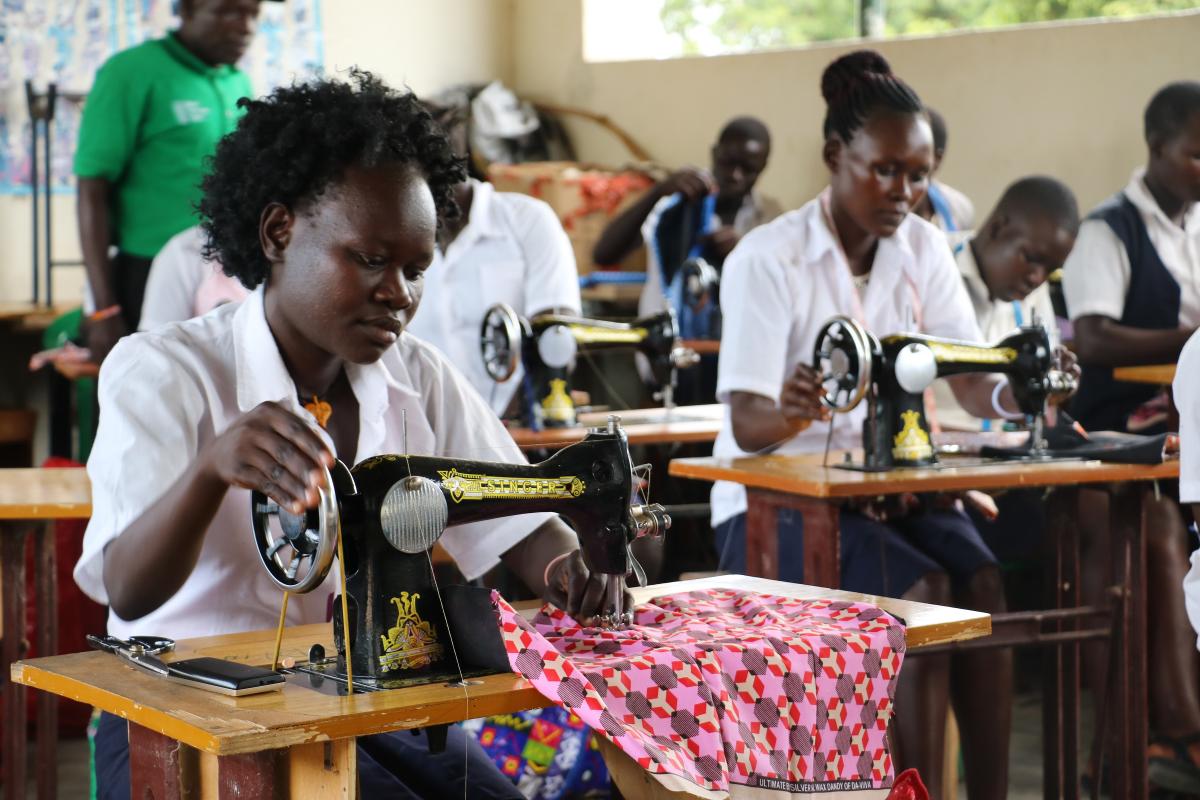Tenisa sews her way to the future
Seventeen-year-old Tenisa Sabbath left her home in South
Sudan in August 2016. Fleeing the rising insecurity in her village of Yei, Tenisa
joined her elder sister and her husband, along with their five children and
together they walked to the Uganda border. Vehicles did not risk the road, as
armed men stopped them and robbed whatever little passengers had managed to
take with them. A journey that would have taken a couple of days therefore took
much longer because of the younger children.
A widow, Tenisa’s mother refused to leave South Sudan,
saying that she was too old and would be a burden on the way.
In Uganda, Tenisa, who had been in secondary school back
home in South Sudan, was not able to immediately join school. Since she had
attained some level of education, it seemed only fair to let her younger nieces
and nephews also get a chance to go to school.
“My sister and her husband could not pay the school dues
because they also had their own children to think of,” she says. In the primary
school, students are required to pay UGX8,000 (USD2) each term as an
examination fee, an amount that seems manageable to people in urban areas but
not so for those in rural areas such as Rhino Camp refugee settlement. In
addition, neither Tenisa’s sister nor her brother-in-law had a source of
income, so they could not raise the money.
Uganda
currently hosts about 1.4 million refugees, 61% of whom are children. The
Government endeavours to provide education for all children, including
refugees, who are expected to be integrated into the Ugandan education system. While
primary school education is more accessible for refugee children, secondary
school provision is limited for refugees and host communities in the refugee-hosting
districts.
According to the Education
Response Plan for Refugees and Host Communities in Uganda – 2018, access to
secondary education among the refugee population in the refugee-hosting
districts remains as low as 11%, with only 33% of these being girls.
So for one and a half years, Tenisa could only help prepare
her nieces and nephews to go to school, while she stayed home and played a
motherly role.
This changed one day when some girls in the neighborhood
told her about a programme they were on – it was a free programme for children
who had dropped out of school but wanted to re-enroll.
She therefore enrolled on the final year of the Accelerated
Education Programme (AEP). The AEP is a three-year programme that uses a
catch-up method or accelerated curriculum to enable children who had dropped
out of school to re-enroll and either be reintegrated into the formal education
system or take up vocational skills training. Year one takes primary one to
three, year two takes primary four and five while year three takes primary six
and seven.
Although AEP classes take place only in the afternoon,
Tenisa was not a regular at school.
“I loved studying, but did not attend
school regularly as I still had to help in taking care of the home,” she says.
So when she did the Primary Leaving
Examinations (PLE), Tenisa did not pass well enough to join secondary school. This
could be attributed to absenteeism, as well as curriculum differences. Schools
in Uganda run on the Uganda education curriculum, a challenge that many
refugees face, especially those who rejoin school in higher classes.
However, all hope was not lost for Tenisa
– she had two options, either to re-sit the PLE examinations or join a vocational
skills training institute. She chose the latter and is now confident that that
is the best decision she could have made. She is learning tailoring at the
Youth Skills Development Centre in Siripi, Rhino Camp refugee settlement. She
is one of 100 youth getting training in different skills, funded by the European
Union Emergency Trust Fund for Africa.
Tenisa is indeed sewing her way to her
future, starting with the uniform she is wearing. “I sewed it myself. Each of
us in the classroom had to make their own uniform at the beginning of the course,”
she says excitedly.
When training ends, Tenisa and her classmates will go for internship,
during which they will be exposed to the practicalities of the business world.
Afterwards
they will do their national examinations and on passing get a Worker’s PAS (Practically
Acquired Skills), a document that bears their qualifications and enables them
to get work.
Although the vocational training
institute is privately owned and run, it collaborates with the national
Directorate of Industrial Training, enabling its trainees to get the requisite
skills as well as the necessary recognition they need to be able to work in the
country.
Life does not look as bleak for Tenisa anymore.
She has hope – she knows that this skill will open the door to an independent
life as well as a bright future.
And if peace returns to South Sudan, she
is ready to go back home and set up a life of independence and self-sustenance
using the knowledge and skills she gained.
“Skills do not rot,” she says. “What I
have got here is something that I can use for the rest of my life.”
Latest news from this project
No news

